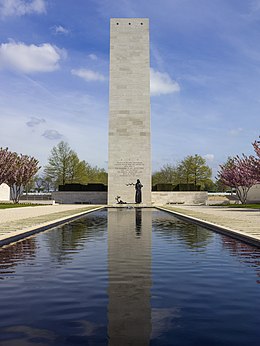Netherlands American Cemetery and Memorial

Entrance.
|
|
| Details | |
|---|---|
| Location | Margraten |
| Country | Netherlands |
| Coordinates | 50°49′N 5°48′E / 50.817°N 5.800°ECoordinates: 50°49′N 5°48′E / 50.817°N 5.800°E |
| Size | 26.5 ha (65.5 acres) |
| No. of graves | 8,301 |
| Website | Netherlands American Cemetery |
| Find a Grave | Netherlands American Cemetery |
The World War II Netherlands American Cemetery and Memorial (Dutch: Amerikaanse Begraafplaats Margraten) is a war cemetery which lies in the village of Margraten 10 km (6 mi) east of Maastricht, in the most southern part of the Netherlands. It is administered by the American Battle Monuments Commission.
The cemetery site has a rich historical background, lying near the famous Cologne-Boulogne highway, originally built by the Romans and used by Julius Caesar during his campaign in that area. The highway was also used by Charlemagne, Charles V, Napoleon, and Kaiser Wilhelm II. In May 1940, Hitler's legions advanced over the route of the old Roman highway, overwhelming the Low Countries. In September 1944, German troops once more used the highway for the withdrawal from the countries occupied for four years.
The tall memorial tower can be seen before reaching the cemetery which covers 26.5 hectares (65.5 acres). From the cemetery entrance the visitor approaches through the Court of Honor with its pool reflecting the chapel tower. The visitors' building is on the right and the museum with its three engraved operations maps describing the achievements of the American Armed Forces in the area during World War II is on the left. At the base of the tower facing the reflecting pool is a statue representing the grieving mother of her lost son.
The walls on either side of the Court of Honor contain the Tablets of the Missing on which are recorded the names of 1,722 American missing who gave their lives in the service of their country and who rest in unknown graves. Beyond the chapel and tower is the burial area which is divided into sixteen plots. Here rest 8,301 American dead, most of whom lost their lives nearby. Their headstones are set in long curves. A wide tree-lined mall leads to the flag staff which crowns the crest.
...
Wikipedia
